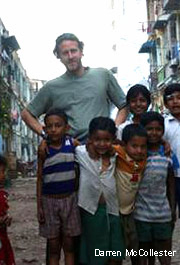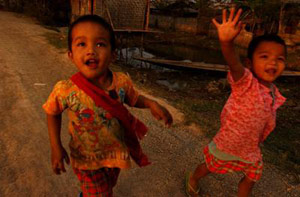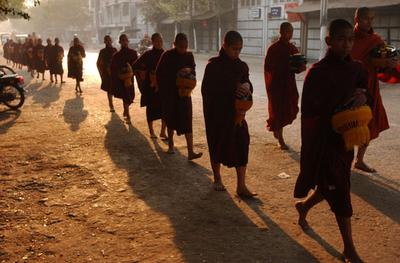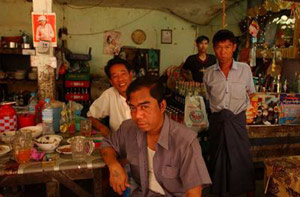 |
 | ||||||||||
A Tourist in Burma
|
 |
|||||||||
|
I admit I knew relatively little about Myanmar when I flew into the country in late February. I knew of political dissident Aung Sun Suu Kyi, and her house arrest. I knew that a military regime controlled the country and cruelly suppressed its people. And I knew they did not like journalists and rarely allowed them in, which is why I entered the country as a tourist. A teacher on holiday, to be exact.
I had just spent the month of January in Baghdad, chasing explosions along Haifa Street with the 1st Cavalry Division. After a month of daily gunfire, rockets, mortar and car bombs, I was looking for a vacation.
Visiting my friend Paula Bronstein in Bangkok, a fellow photojournalist who had broken her ankle covering the tsunami, I asked her which country she most enjoyed traveling to in the region?
"Burma," she said without hesitation. Several other journalists in the room agreed. Although, they informed me, I would have to go in as a tourist.
But wouldn't they see I had just come from Iraq? Couldn't they punch my name into Google and find I was a journalist? My friends smiled and told me not to worry.
So I applied for my visa at the Myanmar embassy. I filled out my form and where it asked, "occupation," I followed my friends' advice. When I approached the man at the desk, he saw what I had written: "teacher."
"What kind?" he said sharply.
"What?" I asked. Now I was nervous. Paula told me they would not ask questions, and I was a terrible liar.
"What kind," he reiterated with a stern face, "and where?" For a brief minute, I saw myself in a Myanmar jail.
The flight into Yangon takes one hour from Bangkok. I was nervous entering the small airport. What if they began asking me teacher questions?
"How much is 4 times 25?"
I could get that one. But if they included long division I would break under pressure. And if they looked inside my bag they would see one pair of pants, 2 shirts, one pair of socks, and a rather large looking professional D1x camera, two lenses, and a dozen flash cards. Wondering how many tourists eschewed shampoo and soap for spare camera batteries, I stepped to the counter and showed my passport.
A pleasant woman waved me through customs and another man helped me fill in the blank on where I was staying in Yangon. It took about 5 minutes.
"Welcome to Myanmar," said a grinning taxi driver in perfect English.
"You are American?"
I told him yes.
"What do you do for work?"
I winced because I knew I had to lie.
"I am a teacher."
He told me it was a good profession.
"Tell me," he said, "What do you think of your president?"
I was stunned to hear this man speak of politics. In the two weeks I'd been in country not one person had gone near the subject. Now this man asked me a question openly, a question that could get him thrown in jail for years.
Shrugging and looking around I said, "I voted for the other guy?"
He looked up over his eyeglasses.
Almost sadly he said, "I think he does not care for people."
He told me he had a son who studied at a university in southern California. He asked me for a favor.
"Could you call him? Could you tell him his father is proud of him?"
On the plane back to Bangkok, I was thinking of how the people of Myanmar are governed by a sinister hand that is unseen but wholly there; and yet they smile and sing, working for pennies and mere existence. Not once did a person complain (although that can get you a life sentence in Myanmar) but somehow I had the feeling that these people would not complain even if they were allowed. Complaining did not seem to be part of their makeup.
A man sitting beside me asked, "How did you like Myanmar?"
"I love it," I told him. "The people are great."
Nodding he said, "What do you do for work?"
I didn't hesitate. "I am a photojournalist," I told him, and leaned back in my seat.
Note: Anyone traveling to Myanmar should make sure to stay at private owned hotels and hostels, and not use government sponsored businesses.
© Darren McCollester
Dispatches are brought to you by Canon. Send Canon a message of thanks. |
||||||||||
Back to June 2005 Contents
|
|



